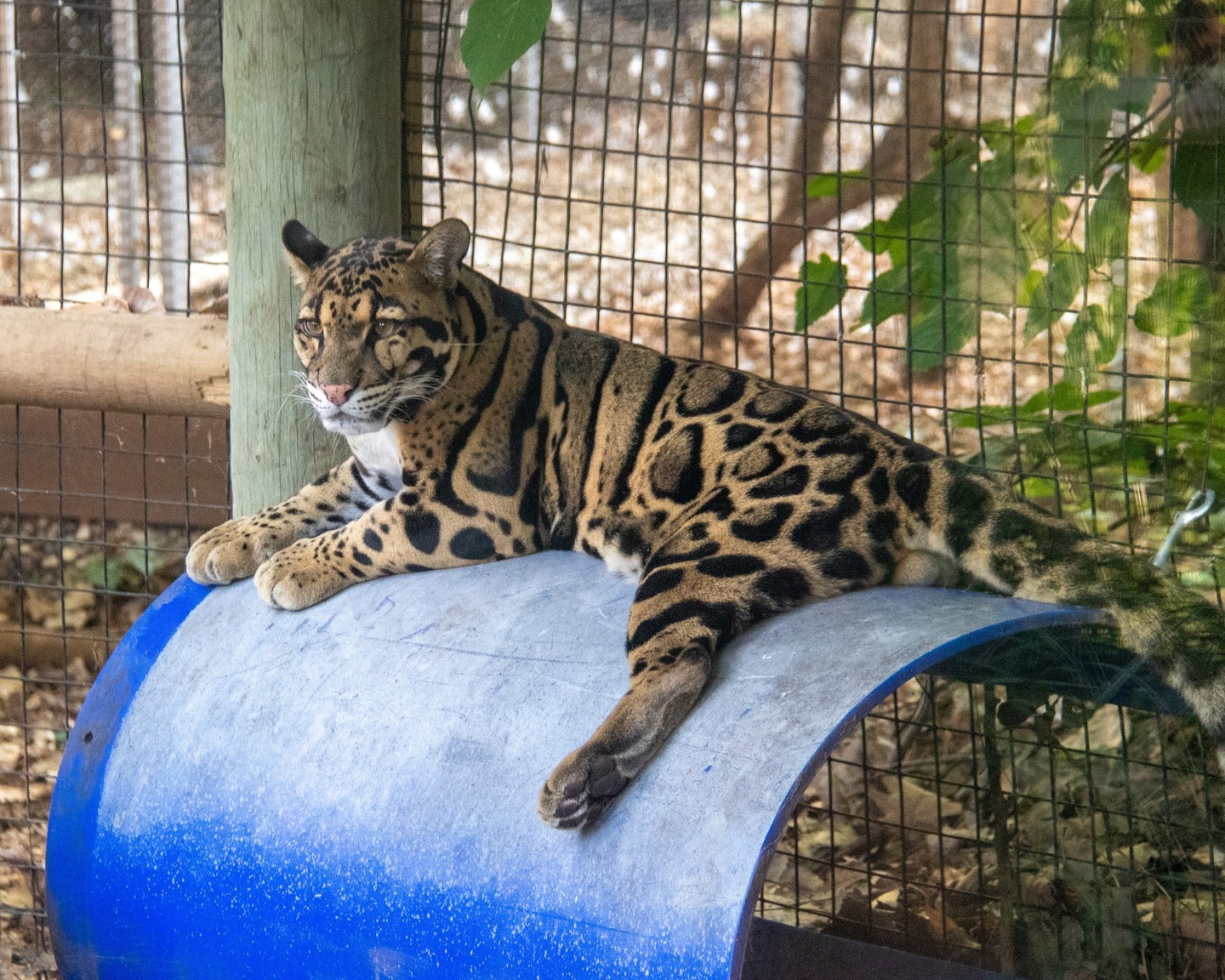Summary:
1. Clouded leopards are native to the Himalayan foothills, Southeast Asia, and Southern China.
2. Their unique adaptations allow them to climb trees headfirst and open their mouths wide.
3. Clouded leopards bridge big and small cats and communicate through growling, hissing, and chuffing.
4. Deforestation and habitat loss significantly threaten their declining population.
5. Visit Maui, the clouded leopard, at the Zoo and keep an eye out for him high up in the trees.
Happy International Clouded Leopard Day! Today, we celebrate one of the world’s most unique and fascinating feline species. The clouded leopard, also known as Neofelis nebulosa, is a stunning creature that captivates the hearts of nature enthusiasts and animal lovers alike. Its striking appearance, incredible adaptability, and important conservation status make this day all the more special. So, let’s dive into the world of the clouded leopard and learn why it deserves our attention and admiration.
First and foremost, it’s essential to understand where clouded leopards call home. These magnificent creatures are native to the Himalayan foothills, throughout Southeast Asia, and into Southern China. Their natural habitats span countries such as Nepal, India, Bangladesh, Myanmar, Thailand, and Malaysia. From lush forests to rugged terrains, they have adapted to diverse environments. However, due to habitat loss and human encroachment, their populations face a significant decline, which has led to their vulnerable status.
One of the most remarkable aspects of clouded leopards is their incredible tree-climbing abilities. Unlike most big cat species, these leopards spend much time in the trees. Their specially adapted ankles allow them to climb down trees headfirst, making them agile and expert climbers. Imagine watching these elusive creatures navigate the dense canopies effortlessly, leaping from branch to branch with grace and precision. It truly is a sight to behold.
But that’s not all! Clouded leopards possess another unique feature that distinguishes them from other feline species. They can open their mouths at an astonishing 100-degree angle. This wide gape enables them to catch prey easily, ensuring survival in the wild. Just imagine the power and flexibility required to achieve such a feat. It’s truly a testament to the unparalleled adaptability of these magnificent creatures.
Clouded leopards are often described as bridging the gap between big and small cats. While they share similarities with the big cat family, such as their strong jaws and sharp claws, they also exhibit characteristics commonly associated with small cats. Their slender build, long tail, and unique fur patterns make them an intriguing species to study and observe. This blend of traits adds to the allure and mystique surrounding clouded leopards.
When it comes to vocalizations, clouded leopards have a unique repertoire. Unlike their roar-loving relatives, clouded leopards are unable to roar or purr. Instead, they communicate through various sounds, such as growling, hissing, and chuffing. These vocalizations serve as a means of asserting dominance, attracting mates and expressing their emotional state. Just imagine hearing the powerful growl of a clouded leopard echoing through the forest. It’s an unforgettable experience.
Unfortunately, the clouded leopard’s existence is under threat due to various human activities. Deforestation, primarily driven by industries such as palm oil production and rubber plantations, poses a significant challenge to their survival. As their natural habitats are cleared to make way for human settlements and agriculture, clouded leopards face a scarcity of food and increased conflict with humans. This detrimental cycle pushes their populations towards decline, making conservation efforts all the more crucial.
On this special day, we must remember to celebrate the clouded leopard’s resilience and beauty while acknowledging the urgent need for protection. As caretakers of this planet, we are responsible for ensuring the survival of these incredible creatures and their habitats. By supporting conservation organizations, advocating for sustainable practices, and spreading awareness, we can positively impact the future of clouded leopards.
So, next time you visit a zoo, keep an eye out for Maui, the clouded leopard. Known for his fondness for napping high up in the trees, Maui is a prime example of the enchanting nature of these creatures. Take a moment to gaze up and appreciate the grace and elegance of this magnificent species. And remember, every action we take, big or small, can contribute to preserving clouded leopards and the delicate balance of our natural world.
Let’s celebrate this International Clouded Leopard Day with awe and inspiration, reminding ourselves and others of the importance of wildlife conservation. Together, we can ensure a brighter future for clouded leopards like Maui and all the amazing creatures that share our planet.
*****
Source Description
Happy International Clouded Leopard Day! Let’s celebrate Maui today!
Want to learn more?
🐾 Clouded leopards are native to the Himalayan foothills throughout Southeast Asia and Southern China.
🐾 They spend lots of their time in trees and have specially adapted ankles that allow them to climb down trees headfirst!
🐾 Clouded leopards can open their mouths to an impressive 100-degree angle!
🐾 While more closely related to big cats, they are frequently described as bridging the gap between big and small cats.
🐾 Clouded leopards cannot roar or purr. Instead, vocalizations include growling, hissing and chuffing.
🐾 Clouded leopards are considered vulnerable with a declining population.
🐾 The main threat to their populations is deforestation, mainly for palm oil production, rubber plantations and clearing for settlements. This results in a lack of food and animal-human conflict.
Make sure to visit Maui the next time you visit the Zoo! Maui likes to take naps high up in the trees, so make sure you look up to spot him.


